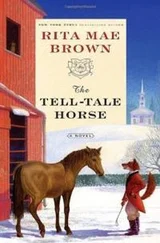Mary came over and kissed her husband’s cheek. “You see to that, Barth. I knew when I looked at you that you were a man who would succeed.”
“I thought you said I was trouble,” Bartholomew teased. “And do you know what I thought when I first saw you? There’s a colleen worth fighting for! And there’s a girl of strong opinion!”
“You like the strong opinion?”
He shrugged. “I had no choice.”
She swatted at him with a clean wooden spoon. “I ought to crack you wicked hard.”
“I am never bored. And I am well aware that you with your rosy cheeks, your heavenly bosom, your full figure, you could have won any heart you wished. But you accepted me, a captured fellow, a man fifteen years your senior, gray amidst the black hair, in my mustache, even, you picked me.”
Mary pursed her lips, as if she’d just made a practical decision. “You actually listened to what I had to say. Father and Mother were worried, of course.” She walked back to the stove. “All that’s behind us now.”
“Are you happy, love?”
She turned to look at him. “I am the happiest woman in York County.”
“Then I am content.”


Tuesday, July 19, 2016
At eleven o’clock in the morning, the mercury read eighty-one degrees. With seventy-five percent humidity, cloud cover blocked the sun. Accustomed to working outside in all weather, Harry paid no heed to the drizzle turning into a light rain. Chores finished, she ducked into the house, changed her shirt, did not change her jeans.
“Where are you going?” Tucker followed her. “You’ve that got ‘I’m going somewhere’ air.”
She swapped her wet baseball cap for a dry one, tucking her hair into it as best she could. Harry, like most women, moved through hairstyles. In high school she wore her hair shoulder length, tied into a ponytail at the nape of her neck when playing volleyball, softball, basketball, whatever was in season, plus riding at home. In college, she went through the buzzed-hair phase and thankfully got through it. Over the years, she moaned and groaned along with Susan and her girlfriends about what to do with their hair. Do you spend a fortune at the beauty parlor? Do you go for flash or convenience? These days, it seemed even the area’s two dedicated bombshells, BoomBoom Craycroft and Alicia Palmer, elected convenience. However, one must realize convenience does not preclude coloring because Susan pitched a fit about the ever-increasing gray hair. Harry, with a touch of gray, refused to color her hair. Her rationale was she could buy bags of good alfalfa for the price of one color job. So Harry kept her hair in what used to be called a short pageboy. It was straight as a stick, so the cut worked. While it pained her, she spent money on a good haircut.
Tucker watched as her beloved human fussed for all of ten minutes, smacked on a touch of light lipstick, walked through the house.
“Hey, where are you going?” Pewter asked.
“I don’t know, but we’re going.” Tucker quickly thought to zoom to the car, sit by the door.
“If you’re going, I’m going.” The fat cat stretched, then followed Tucker, not that she would admit affection for the dog.
Asleep on the counter, the tiger cat roused herself and leapt down. Now three furry creatures trailed Harry until Tucker charged ahead.
“Oh, she pulls that every time.” Pewter sniffed. “You know, the panting, eager, I-can’t-live-without-you look. Please, have some self-respect. I prefer proper deportment.”
“Of course you do.” Mrs. Murphy’s voice carried a hint of humor.
Mrs. Murphy knew that oh-so-proper deportment could fly out the window in a skinny minute. Harsh words would be uttered, claws unleashed, and more than occasionally, a bloody nose followed. No matter what, fur flew.
The light rain didn’t provoke a run, but Harry walked briskly. Looking down at the three musketeers, she opened the cargo door of her Volvo station wagon and they jumped in.
Once behind the wheel, she turned on the motor, checked the dash should any vital signs be amiss, then read her mileage: “198,762. You know, gang, soon time for a new car. This isn’t even that old, but boy, do we rack up the miles.”
“Your truck is from 1978,” Tucker reminded her, which was decades and decades before his birth.
Harry’s father had bought it when she was just four years old. She babied that truck; she used it hard, but she still babied it. She replaced hoses long before they wore out. Years ago, she had the entire engine dismantled and cleaned. She was beside herself with joy. Early this spring, she had the silver-and-blue truck painted. People, almost always men, constantly tried to buy that truck from her. Why would Harry part with a truck that wasn’t controlled by computer chips, that used manual transmission, and, best of all, that when she cut on the motor the satisfying burble of a powerful V-8 engine sang to her?
The Volvo did not sing to her when she turned it on, but being a station wagon and well built, she learned to appreciate its good qualities and she learned to drive by computer chip. Not that she liked it.
The animals enjoyed the Volvo because they had beds in the back and they could see well out of the cargo window. And with a half leap, all three could move up into the second row of seats or even the first. Mrs. Murphy, in particular, wished to help Harry drive. Human eyes left a lot to be desired, but then they couldn’t help it. The tiger cat believed she helped ensure safety.
Harry remembered what her father had told her about rain: The roads are more dangerous when the rain begins. She drove accordingly, reaching the Ivy post office in twenty minutes.
Cracking the windows a bit, she hopped out, pushed the door open to the narrow post office service counter at the end. The post office boxes were on her right as she walked down. The metal boxes filled the wall, which was maybe eight feet high and twelve to fourteen feet long. It was a small post office, so not too many post boxes.
It reminded her of her old post office in Crozet. She became the Crozet postmistress right out of Smith College after the postmaster, George Hogendobber, died and people were desperate for someone to run the old country office. Harry took the job, no other prospects at the time, figuring it would be temporary. George’s widow, wise and kind Miranda, helped her enormously. Ten years later, Harry still sorted mail, pushed the carts with the cats in them, spoke with everyone who came into the post office, which was to say all of Crozet.
But times change. New people moved in, their houses with granite countertops and controlled lighting. People of some means, mostly quite nice but demanding. A little country post office would never do. Plus, Harry ran out of post boxes, had a waiting list that stretched into next week.
The federal government built a new, large, gleaming post office. The job of running it was offered to Harry but with an appalling list of restrictions, including not being able to bring Mrs. Murphy, Pewter, and Tucker to work. She declined, but she did miss the daily contact. She also missed hearing the old uneven wooden floors creak, the sound of a metal box opening from the outside, requests for the prettiest stamps, especially ones featuring flowers, birds, or historical sites. Stamps had become little works of art during her tenure. She still loved looking at them.
Читать дальше














